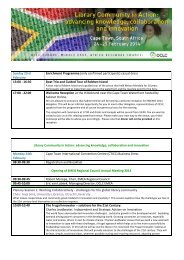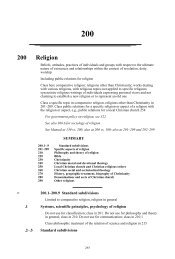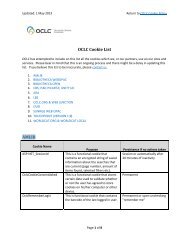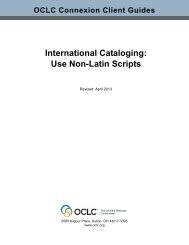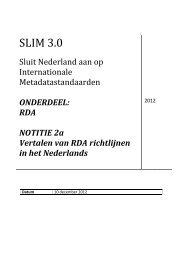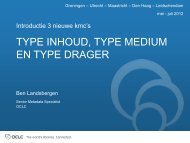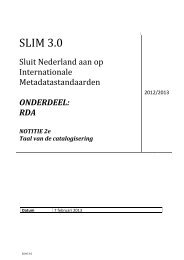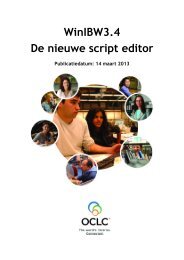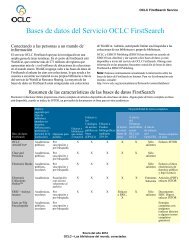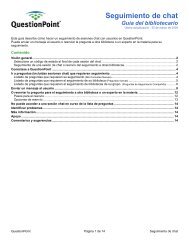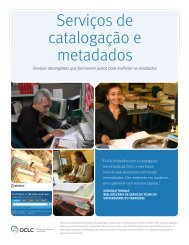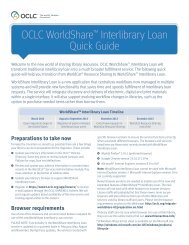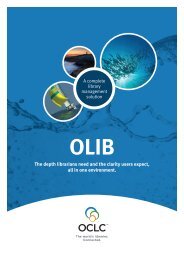NextSpace Issue No. 3 - OCLC
NextSpace Issue No. 3 - OCLC
NextSpace Issue No. 3 - OCLC
You also want an ePaper? Increase the reach of your titles
YUMPU automatically turns print PDFs into web optimized ePapers that Google loves.
iSSN: 1559-0011<br />
Frederick G. Kilgour<br />
January 6, 1914 – July 31, 2006<br />
S P E C I A L E D I T I O N<br />
<strong>No</strong>. 3
Frederick Gridley Kilgour<br />
January 6, 1914<br />
Born, Springfield, Massachussetts<br />
1935<br />
a.B., Harvard College<br />
1935—42<br />
Harvard College Library<br />
assistant, Circulation and<br />
Reference Department 1935—<br />
1938<br />
assistant to Director 1938—<br />
1940<br />
Chief, Circulation Department<br />
1940—1942<br />
1938<br />
Publishes scholarly paper #1<br />
1940<br />
Marries Eleanor Beach<br />
1942—45<br />
Office of Strategic Services<br />
1943—46<br />
Lt., U.S. Naval Reserve, active<br />
Duty<br />
1946—48<br />
U.S. Dept. of State<br />
Deputy Director, Office of<br />
intelligence, Collection and<br />
Dissemination<br />
1948—1967<br />
Yale University<br />
Fellow, Davenport College<br />
1950—1967<br />
Lecturer in the History of<br />
Science 1950—1959<br />
Lecturer in the History of<br />
Science and Medicine 1961—<br />
1967<br />
Librarian, Yale Medical Library<br />
1948—1965<br />
associate Librarian for Research<br />
and Development 1965—1967<br />
1967<br />
Founds <strong>OCLC</strong>, serves as first<br />
executive director and president<br />
1967—1984<br />
The Ohio State University<br />
Professor of Library<br />
administration<br />
1971<br />
Creates WorldCat<br />
1978<br />
Founds <strong>OCLC</strong> Office of Research<br />
1979<br />
Creates <strong>OCLC</strong> Online interlibrary<br />
Loan<br />
1980<br />
Steps down as <strong>OCLC</strong> President<br />
& CEO<br />
1981—1984<br />
<strong>OCLC</strong> Board of Trustees<br />
Vice Chair, New Ventures<br />
1981—1983<br />
Founder Trustee 1984<br />
1984—1987<br />
Director, international Electronic<br />
Publishing Research Centre<br />
Chairman of the Board, applied<br />
information Technologies Research<br />
Center<br />
1990—2004<br />
School of information and Library<br />
Science, University of <strong>No</strong>rth<br />
Carolina at Chapel Hill<br />
Distinguished Research<br />
Professor<br />
1995<br />
Resigns from <strong>OCLC</strong> Board of<br />
Trustees<br />
1998<br />
Publishes The Evolution of<br />
the Book<br />
2004<br />
Publishes scholarly paper #205<br />
July 31, 2006<br />
Dies, Chapel Hill, <strong>No</strong>rth Carolina<br />
<strong>No</strong>. 3 September, 2006<br />
iSSN: 1559-0011<br />
editor<br />
Tom Storey<br />
Managing editor<br />
Wendy McGinnis<br />
Contributing writer<br />
Phil Schieber<br />
design<br />
Mark Uskavitch<br />
<strong>NextSpace</strong> MC234<br />
6565 Frantz Road<br />
Dublin, Ohio 43017-3395 USa<br />
1-800-848-5878<br />
Send questions, comments,<br />
subscription requests and<br />
address/contact updates to:<br />
nextspace@oclc.org<br />
For more information about<br />
<strong>OCLC</strong>, including contacts for<br />
<strong>OCLC</strong> offices and affiliated<br />
partners, visit the <strong>OCLC</strong> Web<br />
site at: www.oclc.org<br />
<strong>NextSpace</strong> (iSSN: 1559-0011)<br />
is published four times a year by<br />
<strong>OCLC</strong> Corporate Marketing and<br />
is distributed at no charge. its<br />
contents may be reproduced in<br />
whole or part provided that credit<br />
is given.<br />
all products and services named<br />
in <strong>NextSpace</strong> are trademarks or<br />
service marks of their respective<br />
companies. Previous issues were<br />
published in January 2006 and<br />
June 2006.
Remembering Fred Kilgour<br />
I was fortunate to have known fred for the<br />
past eight years. He stayed in touch with <strong>OCLC</strong>, and we<br />
met on several occasions. I look back fondly on each of<br />
them.<br />
The first time I met Fred was in June 1998, at my first<br />
<strong>OCLC</strong> President’s Luncheon at the Annual ALA Conference<br />
in Washington, D.C. His flight had been delayed, and<br />
he arrived about 15 minutes into the luncheon. The 1,000<br />
people there gave him a standing ovation as he walked to<br />
his seat at a reserved table in the front of the room.<br />
Another occasion was in 2002, on what would be Fred’s<br />
last trip to <strong>OCLC</strong> headquarters in Dublin, to the building<br />
that bears his name. He was in town to receive the Ohio<br />
Senator George Voinovich Award for Information Innovation.<br />
He stopped by <strong>OCLC</strong>, where about 300 staff members<br />
showed up in our 153-seat auditorium, and those who<br />
couldn’t get in watched him on TV in our atrium. They<br />
gave him a standing ovation.<br />
I was also able to spend time with Fred on January 6,<br />
2004 at the Louis Round Wilson Library at the University<br />
of <strong>No</strong>rth Carolina at Chapel Hill. <strong>OCLC</strong> and the UNC<br />
School of Information and Library Science sponsored a<br />
90th birthday celebration for Fred. Needless to say, he got<br />
a standing ovation.<br />
The last time I saw Fred was on February 22 of this<br />
year. Fred and his wife, Eleanor, joined Lorcan Dempsey,<br />
Vice President, <strong>OCLC</strong> Programs and Research, and me<br />
for lunch on the campus of the University of <strong>No</strong>rth Carolina<br />
at Chapel Hill. Later, Lorcan delivered the inaugural<br />
presentation in the <strong>OCLC</strong>/Frederick G. Kilgour Lecture<br />
in Information and Library Science, a series that <strong>OCLC</strong><br />
endowed in 2004. Both Fred and Eleanor were in good<br />
spirits and were pleased to see that the lecture series was<br />
going forward.<br />
As I go to work each day in the Kilgour Building at<br />
<strong>OCLC</strong>, I have to walk by a portrait of Fred in the atrium.<br />
I never fail to ask myself if I have a plan for that day which<br />
will in fact move <strong>OCLC</strong> closer to achieving its goals. At<br />
night, when I leave my office overlooking Lake Fred, I have<br />
to walk by Fred’s portrait again, and I ask myself, did<br />
I accomplish enough today? Fred set the bar dauntingly<br />
high, but the joy of stretching to achieve the vision is exciting<br />
and energizing.<br />
Fred Kilgour lived a rich life that was full of accomplishment.<br />
He indeed casts a long shadow and leaves us<br />
with a great legacy and an exciting future. Our sincere<br />
condolences go out to the Kilgour family. I also want to<br />
express to Eleanor Kilgour, Fred’s wife of 65 years, the<br />
deepest gratitude of the <strong>OCLC</strong> cooperative. Thank you,<br />
Eleanor, for sharing Fred with us all these years.<br />
<strong>OCLC</strong> will celebrate Fred’s life and his contributions<br />
to the public good in a number of venues in the coming<br />
months. I expect that he still has several standing ovations<br />
coming.<br />
Jay Jordan<br />
<strong>OCLC</strong> President and Chief Executive Officer<br />
Lorcan Dempsey,<br />
Fred, Eleanor and I on<br />
February 22, 2006.<br />
<strong>NextSpace</strong> 1
Librarian...<br />
educator...<br />
historian...<br />
entrepreneur<br />
Frederick G. Kilgour is widely recognized as<br />
one of the leading figures in 20th-century<br />
librarianship for using computer networks to<br />
increase access to information in libraries<br />
around the world.<br />
2 <strong>NextSpace</strong>
“It is very likely that libraries will in<br />
some way in the next half century<br />
begin to make use of magnetic,<br />
electronic, or other types of memory<br />
units for handling and producing<br />
information.”<br />
Yale Medical Library Annual Report, 1951<br />
Kilgour was among the earliest proponents<br />
of adapting computer technology to library<br />
processes. At the dawn of library automation<br />
in the early 1970s, he founded <strong>OCLC</strong><br />
Online Computer Library Center and led<br />
the creation of a library network that today links 57,000<br />
institutions in 111 countries.<br />
In 1971, he developed a database, WorldCat, that now<br />
contains more than 70 million entries for books and other<br />
materials and more than one billion location listings for<br />
these materials in libraries around the world. It is regarded as<br />
the world’s largest computerized library catalog, including<br />
not only entries from large institutions such as the Library<br />
of Congress, the British Library, the Russian State Library<br />
and Singapore National Library, but also from small public<br />
libraries, art museums and historical societies. It contains<br />
descriptions of library materials and their locations. More<br />
recently, the database provides access to the electronic full<br />
text of articles and books as well as images and sound<br />
recordings. It spans 4,000 years of recorded knowledge.<br />
Every 10 seconds a library adds a new record.<br />
Ohio College Library Center<br />
Kilgour had been an academic librarian and historian<br />
of science and technology at Harvard and Yale for 30<br />
In 1948, Kilgour became Librarian<br />
of the Yale Medical Library.<br />
years when the Ohio College Association hired him in<br />
1967 to establish the world’s first computerized library<br />
network, the Ohio College Library Center, on the campus<br />
of The Ohio State University in Columbus. Under<br />
Kilgour’s leadership, the nonprofit corporation introduced<br />
a shared cataloging system in 1971 for 54 Ohio<br />
academic libraries.<br />
At that time, most libraries maintained card catalogs as<br />
guides to their collections, and librarians had to type individual<br />
cards for each item, a labor-intensive and expensive<br />
procedure. The shared cataloging system and database that<br />
Kilgour devised made it unnecessary for more than one<br />
library to originally catalog an item. A library could use the<br />
cataloging information already in the database, and add<br />
items not already entered. Of equal importance, the shared<br />
catalog enabled interlibrary lending, sparing libraries the<br />
expense of adding material to their own collections. The<br />
network quickly grew beyond Ohio to all 50 states and<br />
then internationally.<br />
Thanks to Kilgour, WorldCat connects libraries of all<br />
types and sizes, from giant research libraries to small public<br />
libraries around the world. It enables people to have access<br />
to library collections irrespective of where they are located.<br />
People can also access the database and library collections<br />
through the World Wide Web.<br />
<strong>NextSpace</strong> 3
“Libraries now fi nd themselves forced to a dynamic<br />
state of instability, which should not be confused<br />
with insecurity. Since the age of Pericles, the unstable<br />
periods in human history have been the most<br />
productive periods. Certainly, the period of instability<br />
into which libraries are now entering after a long period<br />
of changelessness will be one of the intellectually<br />
productive periods in librarianship.”<br />
“implications for the Future of Reference information Service,” in Proceedings of the Conference held at the School of<br />
Library Service, Columbia University, March 20-april 1, 1966<br />
Harvard<br />
Frederick Gridley Kilgour was born in Springfi<br />
eld, Mass. on Jan. 6, 1914, to Edward Francis<br />
and Lillian Piper Kilgour. Upon graduating<br />
from Harvard College in 1935, he became assistant<br />
to the director of the Harvard University<br />
Library, where he began experimenting in automating<br />
library procedures, primarily the use of punched cards<br />
for a circulation system. At the same time he undertook<br />
graduate study under George Sarton, a pioneer in the new<br />
discipline of the history of science, and began publishing<br />
scholarly papers. He also built a collection of microfi lmed<br />
foreign newspapers to give scholars access to newspapers<br />
from abroad, an activity that quickly came to the attention<br />
of government offi cials in Washington, D.C.<br />
World War ii<br />
From 1942 to 1945, Kilgour, with a commission as a lieutenant<br />
in the U. S. Naval Reserve, was Executive Secretary<br />
and Acting Chairman of the U.S. government’s Interdepartmental<br />
Committee for the Acquisition of Foreign Publications<br />
(IDC), which developed a system for obtaining<br />
publications from enemy and enemy-occupied areas. This<br />
organization of 150 persons in outposts around the world<br />
microfi lmed newspapers and other printed information<br />
items and sent them back to Washington, DC.<br />
One example of the kind of intelligence gathered was<br />
the Japanese “News for Sailors” reports listing new mine<br />
4 <strong>NextSpace</strong><br />
oCLC’s fi rst offi ces<br />
were in the william<br />
oxley thompson<br />
Memorial Library<br />
of the ohio state<br />
university.<br />
fi elds that were sent from Washington, D.C. directly to<br />
Pearl Harbor and U.S. submarines in the Western Pacifi c.<br />
Kilgour received the Legion of Merit for his intelligence<br />
work in 1945.<br />
State Department<br />
From 1946 to 1948, Kilgour served as deputy director<br />
in the Offi ce of Intelligence Collection and Dissemination<br />
in the Department of State.<br />
In 1948, he was named Librarian of the Yale Medical<br />
Library. At Yale he was also a lecturer in the history of science<br />
and technology and published many scholarly articles<br />
on those topics.<br />
Yale<br />
While running the Yale Medical Library, Kilgour began<br />
publishing studies and articles on library use and effectiveness.<br />
He asked his staff to collect empirical data, such<br />
as use of books and journals by categories, to guide selection<br />
and retention of titles. He viewed the library “not as<br />
a mere depository of knowledge,” but as “an instrument<br />
of education.”
“The outstanding accomplishment<br />
of the year was<br />
the implementation,<br />
operation, and enhancement<br />
of the online union catalog<br />
and shared cataloging<br />
system.”<br />
Ohio College Library Center Annual Report,<br />
1971/72<br />
On August 26, 1971, the Alden<br />
Library at Ohio University became the fi rst<br />
library in the world to do online cataloging.<br />
That fi rst day, Ohio University was able to<br />
catalog 133 books online on a SPIRAS LTE<br />
terminal. That fi rst night, back in Columbus,<br />
the <strong>OCLC</strong> computer system was struck by<br />
lightning—an auspicious beginning indeed!<br />
In 1961, he was one of the leaders in the development<br />
of a prototype computerized library catalog system for the<br />
medical libraries at Columbia, Harvard and Yale Universities<br />
that was funded by the National Science Foundation.<br />
In 1965, Kilgour was named associate librarian for research<br />
and development at Yale University. He continued to conduct<br />
experiments in library automation and to promote<br />
their potential benefi ts.<br />
In his professional writings, Kilgour pointed out that<br />
the explosion of research information was placing new<br />
demands on libraries to furnish information completely<br />
and rapidly. He advocated the use of the computer to<br />
eliminate human repetitive tasks from library procedures.<br />
He recognized nearly 40 years ago the potential of linking<br />
libraries in computer networks to create economies of scale<br />
and generate “network effects” that would increase the<br />
value of the network as more participants were added.<br />
Online cataloging<br />
at the groundbreaking<br />
ceremony in dublin,<br />
ohio, on June 5, 1979,<br />
kilgour described<br />
oCLC’s new facility<br />
as “not a base, but a<br />
catapult into the future.”<br />
In 1967, the Ohio College Association (a group comprising<br />
the presidents of Ohio’s colleges and universities)<br />
hired Kilgour to lead a nonprofi t corporation, the Ohio<br />
College Library Center (<strong>OCLC</strong>), in the development of a<br />
computerized library system for the academic libraries in<br />
the state. In 1971, after four years of development, <strong>OCLC</strong><br />
introduced its online shared cataloging system, which<br />
would achieve dramatic cost savings for libraries. For<br />
example, in the fi rst year of system use, the Alden Library<br />
at Ohio University was able to increase the number of<br />
<strong>NextSpace</strong> 5
ooks it cataloged by a third, while it reducing its staff by<br />
17 positions. Word of this new idea spread on campuses<br />
across the country, starting an online revolution in libraries<br />
that continues to this day.<br />
Kilgour was president of <strong>OCLC</strong> from 1967 to 1980,<br />
presiding over its rapid growth from an intrastate network<br />
to an international network. In addition to creating the<br />
WorldCat database, he developed an online interlibrary<br />
loan system that last year libraries used to arrange nearly 10<br />
million loans. Today, <strong>OCLC</strong> has a staff of 1,200 and offices<br />
in seven countries. Its mission remains the same: to further<br />
access to the world’s information and reduce library costs.<br />
From 1981 he stepped down from management but<br />
continued to serve on the <strong>OCLC</strong> Board of Trustees until<br />
1995.<br />
University of <strong>No</strong>rth Carolina<br />
at Chapel Hill<br />
In 1990, he was named Distinguished Research Professor<br />
in the School of Information and Library Science, the<br />
University of <strong>No</strong>rth Carolina at Chapel Hill, and served on<br />
6 <strong>NextSpace</strong><br />
“Developments in modern,<br />
information-based society<br />
are forcing onto libraries<br />
this new objective of<br />
furnishing an individual<br />
with information when<br />
and where he wants it.”<br />
“Evolving, Computerizing, Personalizing,” in American<br />
Libraries, February 1972.<br />
Kilgour was author of<br />
205 scholarly papers.<br />
the faculty until his retirement in 2004.<br />
Kilgour was the author of 205 scholarly papers. He<br />
was the founder and first editor of the journal, Information<br />
Technology and Libraries. In 1998, Oxford University<br />
Press published his Evolution of the Book. His other works<br />
include: Engineering in History; the Library of the Medical<br />
Institution of Yale College and its Catalogue of 1865; and<br />
the Library and Information Science CumIndex.<br />
He received numerous awards from library associations<br />
and five honorary doctorates.<br />
aLa<br />
In 1982, the American Library Association presented<br />
him with Honorary Life Membership. The citation read:<br />
in recognition of his successful pioneering efforts to<br />
master technology in the service of librarianship; the acuity<br />
of his vision that helped to introduce the most modern and<br />
powerful technologies into the practice of librarianship;<br />
the establishment and development of a practical vehicle<br />
for making the benefits of technology readily available to<br />
thousands of libraries; his long and distinguished career<br />
as a practicing librarian; his voluminous, scholarly and prophetic<br />
writings; and above all his fostering the means for<br />
ensuring the economic viability of libraries, the american<br />
Library association hereby cites Frederick Gridley Kilgour
as scholar, entrepreneur, innovator, and interpreter of technology<br />
steadfastly committed to the preservation of humanistic<br />
values.<br />
aSiST<br />
In 1979, the American Society for Information Science<br />
and Technology gave him the Award of Merit. The citation<br />
read:<br />
Presented to Frederick G. Kilgour, in recognition of his<br />
leadership in the field of library automation: as Executive Director<br />
of <strong>OCLC</strong> since 1967, he has succeeded in changing<br />
the conception of what is feasible in library automation and<br />
library networking. His major technological developments,<br />
superb planning and executive abilities, deep insight into<br />
bibliographic and information needs, and unfaltering leadership<br />
have transformed a state association of libraries in a<br />
national interlibrary bibliographic utility.<br />
<strong>OCLC</strong> has proved the feasibility of nationwide sharing of<br />
catalog-record creation and has helped libraries to maintain<br />
and to enhance the quality and speed of service while<br />
achieving cost control—and even cost reduction—in the<br />
face of severely reduced funding. This achievement may<br />
be the single greatest contribution to national networking<br />
in the United States. His work will have a lasting impact on<br />
the field of information science.<br />
In his last appearance at <strong>OCLC</strong><br />
headquarters in Dublin, Ohio,<br />
in 2002, Kilgour addressed a<br />
standing-room-only crowd of 300<br />
staff members Those who couldn’t<br />
get into the 153-seat auditorium<br />
watched on TV in the atrium.<br />
In 1940, he married Eleanor Margaret Beach, a graduate<br />
of Mount Holyoke College, who had taken a job at the<br />
Harvard College Library, where they met. He is survived<br />
by his wife and their daughters, Marta Kilgour and Vajra<br />
Alison Kilgour of New York City, and Meredith Kilgour<br />
Perdiew of <strong>No</strong>rth Edison, New Jersey; grandson, Bradley<br />
Perdiew, and granddaughter, Amy Surma, and five greatgrandchildren.<br />
n<br />
<strong>NextSpace</strong> 7
8 <strong>NextSpace</strong><br />
american Library association<br />
Melvil Dewey Medal Citation<br />
June 29, 1978<br />
american Library association presents the Melvil Dewey Medal for<br />
the year 1978 to Frederick G. Kilgour.<br />
it was out of character for him, but we all felt that Frederick G. Kilgour<br />
must have been retiring early when in 1967 he forsook Yale for<br />
something called the Ohio College Library Center.<br />
“Where was that again, Fred?” we asked incredulously.<br />
“O-C-what-C?”<br />
But Fred was not retiring; rather his major contribution was just<br />
beginning. During the subsequent years he forged a device that, like<br />
the cotton gin, brought about a prompt and profound revolution in the<br />
industry to which it was applied. Life for catalog librarians was never<br />
again the same.<br />
<strong>OCLC</strong> would not have come into being if it had not been for a<br />
quadripartite skein of skills and qualities possessed, perhaps<br />
uniquely, by Fred Kilgour. First, he was thoroughly competent<br />
librarian. Second, he had a high degree of technical acumen. Third,<br />
he was a consummate politician. and fourth, he had skin a foot thick,<br />
which was fortunate indeed because we fought him every step of the<br />
way en route to his Promised Land.<br />
These qualities were also possessed in abundance by the namesake<br />
of this award a century ago. Let it, however, be recorded of Frederick<br />
G. Kilgour in 1978 that he may even have out-Deweyed Dewey.<br />
Robert Wedgeworth, Executive Director, aLa<br />
Eric Moon, President, aLa
Awards and<br />
Recognition<br />
Legion of Merit, 1945<br />
Librarian of the Year, Ohio Library association, 1973<br />
recognition of achievement, Central Ohio Chapter of american Society for<br />
information Science, 1974<br />
Margaret Mann Citation, american Library association, 1974<br />
Melvil dewey Medal, american Library association, 1978<br />
Library and Information technology award, Library and information Technology<br />
association, 1979<br />
Co-recipient academic/research Librarian of the Year award, association of<br />
College and Research Libraries, 1979<br />
award of Merit, american Society for information Science, 1979<br />
honorary doctor of Laws, Marietta College, 1980<br />
honorary doctor of humane Letters, The Ohio State University, 1980<br />
honorary doctor of Laws, College of Wooster, 1981<br />
honorary Life Membership, american Library association, 1982<br />
honorary doctor of humane Letters, Denison University, 1983<br />
Marcia C. noyes award, Medical Library association, 1984<br />
Medical Library association fellowship, 1984<br />
ohio Governor’s award in the field of education, 1986<br />
honorary Life Membership, Special Libraries association, 1986<br />
honorary doctorate of humane Letters, University of Missouri–Kansas City, 1989<br />
ohio Library association hall of fame, 1990<br />
senator George voinovich award for Information Innovation, 2002<br />
topCat hall of fame, Columbus Technology Council, 2005<br />
In 1980, Kilgour<br />
received an<br />
Honorary Doctor<br />
of Laws from<br />
Marietta College.
“The unacceptability of the present electronic book is<br />
often expressed in what as come to be known as the ‘can’t<br />
curl up in bed with it’ syndrome, closely followed by the<br />
‘can’t read it at the beach’ complaint. Both protests are<br />
valid, but it may be supposed that advances in technology<br />
and design will soon overcome these insufficiencies as<br />
they have overcome others in the history of the book.<br />
After all, second- and third-century codices, many a foot<br />
or more tall, hardly constituted bedfellows, any more than<br />
did the seventeen-inch-tall 42-line Gutenberg Bible, or the<br />
taller-than-a-foot folios that followed in 1457, 1459, 1460,<br />
and 1462.”<br />
Evolution of the Book, 1998.<br />
6565 Frantz Rd.<br />
Dublin, OH 43017-3395<br />
<strong>No</strong>n-profit Org.<br />
U.S. Postage<br />
PaiD<br />
Columbus, Ohio<br />
Permit <strong>No</strong>. 5391



